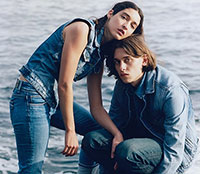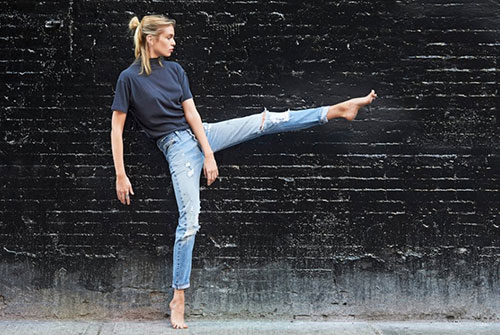"The centerpiece of fast fashion industry ‘denim’ is also one of the most polluting and water intensive fabrics. The fabric requires copious amounts of water across its production three processes that include growing of the cotton, dyeing and finishing the material, and finally texturising the product. This entire process needs approximately 10,000 liters of water for making a single pair of jeans."
 The centerpiece of fast fashion industry ‘denim’ is also one of the most polluting and water intensive fabrics. The fabric requires copious amounts of water across its production three processes that include growing of the cotton, dyeing and finishing the material, and finally texturising the product. This entire process needs approximately 10,000 liters of water for making a single pair of jeans.
The centerpiece of fast fashion industry ‘denim’ is also one of the most polluting and water intensive fabrics. The fabric requires copious amounts of water across its production three processes that include growing of the cotton, dyeing and finishing the material, and finally texturising the product. This entire process needs approximately 10,000 liters of water for making a single pair of jeans.
The environmental and human costs of making denims is also high as the process uses harmful chemicals to create acid-wash and distressed styles of denims. The exposure to such chemicals and the run-offs of these washes can seep into the local water systems of cotton workers, putting them at health risk. As a solution to this, four European brands have introduced innovative denim making process that enable its consumers to not only live in their denims but also nurture and last them.
Emphasis on reliable craftsmanship
Promoting a new kind of eco denim, Huit Denim Co emphasises on reliable craftsmanship for denim-making. The company introduced an initiative called ‘The Denim Breaker Club’ which includes making the ‘breakers’ wear the jeans for six months before sending them back to Hiut for giving them one good wash and reselling them, giving the breaker 20 per cent profit. The brand was trying to inspire a more eco-friendly way of owning denim through this initiative.
The company introduced an initiative called ‘The Denim Breaker Club’ which includes making the ‘breakers’ wear the jeans for six months before sending them back to Hiut for giving them one good wash and reselling them, giving the breaker 20 per cent profit. The brand was trying to inspire a more eco-friendly way of owning denim through this initiative.
Denims made with 40 per cent BCI cotton
Known as a trendy yet functional brand, Ullac was established in 2017. The brand advocates gender neutrality besides fostering a socially and environmentally conscious ethos. The fabric is sourced from Velcorex in France, which has its own water waste treatment plant. The brand is also linked with BCI, which promotes better standards of cotton farming by encouraging fair labour, training for farmers, minimising pesticides or harsh chemicals, and economic development. The denim comes from Italian company Candiani, which has the greenest mill in the blue world. The brand creates its denim with 40 per cent BCI cotton, which is amongst a few of the reasons why it has been awarded the Global Organic Textile Standard and Global Recycling Standard.
Lazer and ozone gas for a faded look
Though German brand Closed, which also uses the Candiani Denim Mill, is not yet a certified eco-label, it plays a huge role in innovating denim in order to make it a kinder industry. The company creates its finishing techniques and is known for its chic style and popular pedal pusher pocket detailing. The company uses lazer and ozone gas to give its denims a faded look and manipulate different shades of blue. Its stone-washing technique substitutes the cheaper but potentially more dangerous process of sandblasting, for the safer use of artificial stones in a drum, creating the same stone wash effect without the output of water and harmful stone debris.
Eco-friendly accessories for non-toxic denims
Netherlands-based Mud Jeans’ dedication to creating a better social, economic and environmental world is supported by an array of certificates, such as BCORP, PETA-approved vegan, Cradle 2 Cradle, Ecocert, GRS. The brand claims to have saved 300 million litres of water, avoided using 700,000 kilos of carbon dioxide and saved 12,000 jeans from landfill in the past 3 years. It turns its old jeans into new one by using recycled and organic cotton.
The brand specifically uses stainless steel buttons that can be easily recycled or reused. It uses laser, ozone and e-flow techniques in the finishing of its jeans. The only few chemicals that it uses in producing its denim are non-toxic and Nordic Swan Ecolabel certified.












